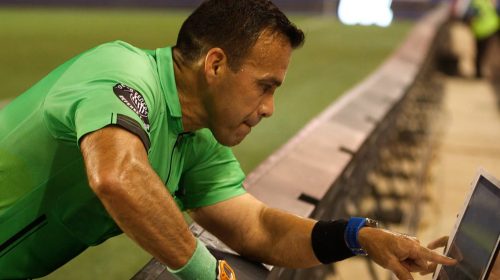The Confederation of African Football (CAF) Champions League second-leg final between Tunisia’s Espérance and Morocco’s Wydad Casablanca came to a dramatic end on 31 May 2019 in Tunis. Mohammed Belaïli‘s 41st minute goal had given hosts Espérance the lead on the day and a 2-1 advantage on aggregate.
Early in the second half, the away team’s Walid El Karti powered home a header which for all intents and purposes looked like a valid equaliser. But the Gambian referee, Bakary Gassama, ruled the goal out for offside, much to the amusement of soccer fans across the continent who are used to that kind of thing in the domestic leagues.
The Moroccans were however having none of it and crowded around Gassama, demanding that a video assistant referee (VAR) review be carried out. The referee refused. As it turned out, the video system on which a VAR review would have been premised was not working. Cue farcical scenes.

The Wydad players declined to resume play and were joined on the pitch by their substitutes and coaching staff. Espérance’s bench followed suit. The Moroccans rebuffed even the entreaties of CAF President, Ahmad Ahmad, who had joined the fray on the field. Meanwhile, back in the stands, brawls were breaking out across the VIP and press sections, and the mixed zone. After the expiration of what would have been regulation time, the referee blew off the game, awarding it to Espérance who were then presented with the trophy and winners medals amid the usual fireworks’ displays.
Wydad formally appealed to CAF. Following an emergency meeting held a few days later in Paris, which as everyone knows is in Africa, the confederation ordered a replay of the match in a neutral venue. Espérance were instructed to return the trophy and medals. The torrent of furious invective unleashed as a result in Tunis was offset, naturally, by resounding Alhamdulilahs from Casablanca.
The Moroccans had ample cause to feel vindicated. In the first leg, a VAR review had ruled out what looked like a good Wydad goal and later, strong claims for a penalty by Wydad which finished the game with 10 men after captain, Brahim Nakach, was sent off. Tellingly, CAF thereafter banned Gehad Grisha, the Egyptian referee of that match, for six months ‘due to poor performance.’
Of the goal disallowed by the Gambian referee in the second leg, Ahmad Ahmad, no less, was quoted to have said after the Paris meeting, ‘You simply could not rule out the goal; it was valid from whichever direction you looked at it.’ TV replays supported that view, prompting the question of whether the referee should have gone to SpecSavers.
The Tunisians have however indicated that they are appealing to FIFA and possibly to the Court of Arbitration for Sports. Their case would certainly draw some support from FIFA’s Laws of the Game.
The rules on VAR were first written into the Laws of the Game by the International Football Association Board (IFAB) in 2018. Only refereeing decisions in four categories, to wit, goals, penalties, direct red cards and mistaken identity (in yellow or red cards), are subject to review. Principle 4 of VAR Protocol states that only the referee can initiate a review of his decision. The VAR may recommend a review but the referee is not bound to accept.
When the referee decides on the review, he makes the square TV sign before requesting the VAR to review the incident and describe to the referee what the VAR has seen. The referee can then make a final decision based on the VAR’s explanation, or if unconvinced, proceed to review footage on a pitch-side monitor before making a final ruling.
It was therefore up to the referee in the second leg to decide whether a VAR review should be applied and his decision not to do so should have been final by the laws of the game. To compound the case against Wydad, Principle 7 of the VAR Protocol forbids players and team officials from surrounding the referee or attempting to influence whether a decision is reviewed, the review process, or the final decision.
For the avoidance of doubt, Principle 12 emphasises that as the VAR will automatically check every situation or decision, there is no need for coaches or players to request a review.
Fundamentally too, the VAR Protocol also says that a match is not invalidated because of malfunctions of the VAR technology or decisions not to review an incident. Even reviews of a non-reviewable situation do not affect the validity of a match.
Perhaps sensitive to the obvious implications of the Protocol, CAF’s official statement on the replay did not mention VAR but offered that ‘the conditions of game [sic] and safety were not met … preventing the match from coming to an end.’ The sweeping indictment piqued national pride in Tunisia and amid more swearing in Arabic, the government moved swiftly to rebut.
‘This is a CAF farce!’ thundered Prime Minister Youssef Chahed. ‘It is a CAF farce!’ cried Interior Minister, Hichem Fourati, echoing his boss like the good politician that he evidently is. Pulling no punches, Fourati asked further why the CAF had permitted the game to start if security and other conditions were not met. Both men demanded that CAF take responsibility rather than blame Tunisia which, they pointed out, routinely organised bigger international events than a mere football game.
There was also talk of sending a diplomatic complaint to Morocco over the incident, evoking the possibility of a ‘This is Sparta!’ scene in Rabat anytime soon. The raised stakes sparked mischievous Internet allusions to la guerra del fútbol, the six-day war between El Salvador and Honduras in 1969 which resulted from a fractious World Cup qualifier.
No doubt, the Moroccans will insist that justice has been done by a replay, if not in black-letter law terms, then on overriding considerations of ‘equity, natural justice and good conscience.’ Wydad claims they were not informed before the game that the VAR system was not working. That assertion opens the door to arguments that their fundamental rights were breached by the lack of prior information, even if the Protocol rendered the actual malfunction irrelevant to the validity of a match.
The Moroccans will also be bolstered by the fact that in order to succeed, any appeal by Espérance has to surmount the formidable legal hurdle of proving that CAF abused its discretion in ordering a replay. The vagueness of CAF’s statement leaves ample room for the confederation to manoeuvre in showing justification before an appellate panel.
Furthermore, Law 7 of the Laws of the Game requires an abandoned game to be replayed unless the competition’s rules or organisers determine otherwise. The question that would be coming from Tunis would surely be, ‘what takhalaa (abandon)?’ Ironically, Wydad’s chairman said in the immediate aftermath that Wydad did not takhalaa the game but had merely been waiting for the referee to decide on whether to review the disallowed goal. Expect the memory of that statement to be wiped out more quickly in Casablanca than you can say takhalaa.
A twice-bitten CAF says that the replay will happen after the Africa Cup of Nations ends in Egypt on 19 July and be refereed by officials from outside Africa. There is no indication so far that the confederation’s chastisement extends to sanctioning the one party at the core of the debacle in Tunis.
A letter of apology from British company, Hawk-Eye, the world leader for VAR technology, revealed that CAF had contracted them to provide the video-review system for the second leg. After repeatedly failing to land the intended system in Tunis in advance of match day, Hawk-Eye arranged for a replacement to be delivered from England on the morning of the game. According to the company however, only part of the equipment arrived due to a baggage handling error by the airline.
In sum, the Tunis fiasco was a decidedly African affair but one whose seeds were sown by things done or undone overseas, in the metropole. Now where have we heard that before? No, not you, Chinweizu, sit down there – we are no longer on that underdevelopment tip.
*Dr. Peter Ntephe is a lawyer and an English FA registered intermediary.










Thanks for the unroll of the events. It’s a shame referee controversy still exists in Africa despite technology designed to prevent exactly same! The match should be replayed with similar rules to the first leg otherwise Wydad faces a clear disadvantage